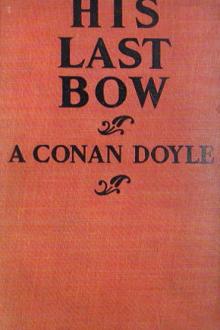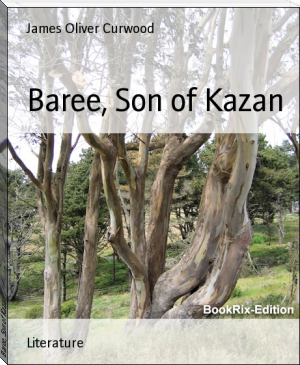Flower of the North, James Oliver Curwood [most popular novels of all time txt] 📗

- Author: James Oliver Curwood
Book online «Flower of the North, James Oliver Curwood [most popular novels of all time txt] 📗». Author James Oliver Curwood
associate the girl whom Gregson had encountered, and who so closely resembled Eileen, with Lord Fitzhugh and the plot against his company. And it struck him with a certain feeling of dread that, if his suspicions were true, Jeanne and Pierre must also be mixed up in the affair. For had not Jeanne, in her error, greeted Eileen as though she were a dear friend?
He went directly to the factor's house, and knocked at the door opening into the rooms occupied by Brokaw and his daughter. Brokaw admitted him, and at Philip's searching glance about the room he nodded toward a closed inner door and said:
"Eileen is resting. It's been a hard trip on her, Phil, and she hasn't slept for two consecutive nights since we left Halifax."
Philip's keen glance told him that Brokaw himself had not slept much. The promoter's eyes were heavy, with little puffy bags under them. But otherwise he betrayed no signs of unrest or lack of rest. He motioned Philip to a chair close to a huge fireplace in which a pile of birch was leaping into flame, offered him a cigar, and plunged immediately into business.
"It's hell, Philip," he said, in a hard, quiet voice, as though he were restraining an outburst of passion with effort. "In another three months we'd have been on a working basis, earning dividends. I've even gone to the point of making contracts that show us five hundred per cent, profit. And now--this!"
He dashed his half-burned cigar into the fire, and viciously bit the end from another.
Philip was lighting his own, and there was a moment's silence, broken sharply by the financier.
"Are your men prepared to fight?"
"If it's necessary," replied Philip. "We can at least depend upon a part of them, especially the men at Blind Indian Lake. But--this fighting--Why do you think it will come to that? If there is fighting we are ruined."
"If the people rise against us in a body--yes, we are ruined. That is what we must not permit. It is our one chance. I have done everything in my power to beat this movement against us down south, and have failed. Our enemies are completely masked. They have won popular sentiment through the newspapers. Their next move is to strike directly at us. Whatever is to happen will happen soon. The plan is to attack us, to destroy our property, and the movement is to be advertised as a retaliation for heinous outrages perpetrated by our men. It is possible that the attack will not be by northerners alone, but by men brought in for the purpose. The result will be the same--if it succeeds. The attack is planned to be a surprise. Our one chance is to meet it, to completely frustrate it--to strike an overwhelming blow, and to capture enough of our assailants to give us the evidence we must have."
Brokaw was excited. He emphasized his words with angry sweeps of his arms. He clenched his fists, and his face grew red. He was not like the old, shrewd, indomitable Brokaw, completely master of himself, never revealing himself beyond the unruffled veil of his self-possession, and Philip was surprised. He had expected that Brokaw's wily brain would bring with it half a dozen schemes for the quiet undoing of their enemies. And now here was Brokaw, the man who always hedged himself in with legal breast-works--who never revealed himself to the shot of his enemies--enlisting himself for a fight in the open! Philip had told Gregson that there would be a fight. He was firmly convinced that there would be a fight. But he had never believed that Brokaw would come to join in it. He leaned toward the financier, his face flushed a little by the warmth of the fire and by the knowledge that Brokaw was relinquishing the situation entirely into his hands. If it came to fighting, he would win. He was confident of himself there. But--
"What will be the result if we win?" he asked.
"If we secure those who will give the evidence we need--evidence that the movement against us is a plot to destroy our company, the government will stand by us," replied Brokaw. "I have sounded the situation there. I have filed a formal declaration to the effect that such a movement is on foot, and have received a promise that the commissioner of police will investigate the matter. But before that happens our enemies will strike. There is no time for red tape or investigations. We must achieve our own salvation. And to achieve that we must fight."
"And if we lose?"
Brokaw lifted his hands and shoulders with a significant gesture.
"The moral effect will be tremendous," he said. "It will be shown that the entire north is inimical to our company, and the government will withdraw our option. We will be ruined. Our stockholders will lose every cent invested."
In moments of mental energy Philip was restless. He rose from his chair now and moved softly back and forth across the carpeted floor of the big room, shrouded in tobacco smoke. Should he break his word to Gregson and tell Brokaw of Lord Fitzhugh? But, on second thought, what good would come of it? Brokaw was already aware of the seriousness of the situation. In some one of his unaccountable ways he had learned that their enemies were to strike almost immediately, and his own revelation of the Fitzhugh letters would but strengthen this evidence. He would keep his faith with Gregson for the promised day or two. For an hour the two men were alone in the room. At the end of that time their plans were settled. The next morning Philip would leave for Blind Indian Lake and prepare for war. Brokaw would follow two or three days later.
A heavy weight seemed lifted from Philip's shoulders when he left Brokaw. After months of worry and weeks of physical inaction he saw his way clear for the first time. And for the first time, too, something seemed to have come into his life that filled him with a strange exhilaration, and made him forgetful of the gloom that had settled over him during these last months. That night he would see Jeanne. His body thrilled at the thought, until for a time he forgot that he would also see and talk with Eileen. A few days before he had told Gregson that it would be suicidal to fight the northerners; now he was eager for action, eager to begin and end the affair--to win or lose. If he had stopped to analyze the change in himself he would have found that the beautiful girl whom he had first seen on the moonlit rock was at the bottom of it. And yet Jeanne was a northerner, one of those against whom his actions must be directed. But he had confidence in himself, confidence in what that night would bring forth. He was like one freed from a bondage that had oppressed him for a long time, and the fact that he might be compelled to fight Jeanne's own people did not destroy his hopefulness, the new joy and excitement that he had found in life. As he hurried back to his cabin he told himself that both Jeanne and Pierre had read what he had sent to them in the handkerchief; their response was a proof that they understood him, and deep down a voice kept telling him that if it came to fighting they three, Pierre, Jeanne, and himself, would rise or fall together. A few hours had transformed him into Gregson's old appreciation of the fighting man. Long and tedious months of diplomacy, of political intrigue, of bribery and dishonest financiering, in which he had played but the part of a helpless machine, were gone. Now he held the whip-hand; Brokaw had acknowledged his own surrender. He was to fight--a clean, fair fight on his part, and his blood leaped in every vein like marshaling armies. That nights on the rock, he would reveal himself frankly to Pierre and Jeanne. He would tell them of the plot to disrupt the company, and of the work ahead of him. And after that--
He thrust open the door of his cabin, eager to enlist Gregson in his enthusiasm. The artist was not in. Philip noticed that the cartridge-belt and the revolver which usually hung over Gregson's bunk were gone. He never entered the cabin without looking at the sketch of Eileen Brokaw. Something about it seemed to fascinate him, to challenge his presence. Now it was missing from the wall.
He threw off his coat and hat, filled his pipe, and began gathering up his few possessions, ready for packing. It was noon before he was through, and Gregson had not returned. He boiled himself some coffee and sat down to wait. At five o'clock he was to eat supper with the Brokaws and the factor; Eileen, through her father, had asked him to join her an hour or two earlier in the big room. He waited until four, and then left a brief note for Gregson upon the table.
It was growing dusk in the forest. From the top of the ridge Philip caught the last red glow of the sun, sinking far to the south and west. A faint radiance of it still swept over his head and mingled with the thickening gray gloom of the northern sea. Across the dip in the Bay the huge, white-capped cliff seemed to loom nearer and more gigantic in the whimsical light. For a few moments a red bar shot across it, and as the golden fire faded and died away Philip could not but think it was like a torch beckoning to him. A few hours more, and where that light had been he would see Jeanne. And now, down there, Eileen was waiting for him.
His pulse quickened as he passed beyond the ancient fort, over the burial-place of the dead, and into Churchill. He met no one at the factor's, and the door leading into Miss Brokaw's room was partly ajar. A great fire was burning in the fireplace, and he saw Eileen seated in the rich glow of it, smiling at him as he entered. He closed the door, and when he turned she had risen and was holding out her hands to him. She had dressed for him, almost as on that night of the Brokaw ball. In the flashing play of the fire her exquisite arms and shoulders shone with dazzling beauty; her eyes laughed at him; her hair rippled in a golden flood. Faintly there came to him, filling the room slowly, tingling his nerves, the sweet scent of heliotrope--the perfume that had filled his nostrils on that other night, a long time ago, the sweet scent that had come to him in the handkerchief dropped on the rock, the breath of the bit of lace that had bound Jeanne's hair!
Eileen moved toward him. "Philip," she said, "now are you glad to see me?"
IX
Her voice broke the spell that had held him for a moment.
"I am glad to see you," he cried, quickly, seizing both her hands. "Only I haven't quite yet awakened from my dream. It seems too wonderful, almost unreal. Are you the old Eileen who used to shudder when I told you of a bit of jungle and wild beasts, and who laughed at me because I loved to sleep out-of-doors and tramp mountains, instead of decently behaving myself at home? I demand an explanation. It must be a wonderful change--"
"There has been a change," she interrupted him. "Sit down, Philip --there!" She nestled herself on a stool, close to his feet, and looked up at him, her hands clasped under her chin, radiantly lovely. "You told me once that girls like me simply
He went directly to the factor's house, and knocked at the door opening into the rooms occupied by Brokaw and his daughter. Brokaw admitted him, and at Philip's searching glance about the room he nodded toward a closed inner door and said:
"Eileen is resting. It's been a hard trip on her, Phil, and she hasn't slept for two consecutive nights since we left Halifax."
Philip's keen glance told him that Brokaw himself had not slept much. The promoter's eyes were heavy, with little puffy bags under them. But otherwise he betrayed no signs of unrest or lack of rest. He motioned Philip to a chair close to a huge fireplace in which a pile of birch was leaping into flame, offered him a cigar, and plunged immediately into business.
"It's hell, Philip," he said, in a hard, quiet voice, as though he were restraining an outburst of passion with effort. "In another three months we'd have been on a working basis, earning dividends. I've even gone to the point of making contracts that show us five hundred per cent, profit. And now--this!"
He dashed his half-burned cigar into the fire, and viciously bit the end from another.
Philip was lighting his own, and there was a moment's silence, broken sharply by the financier.
"Are your men prepared to fight?"
"If it's necessary," replied Philip. "We can at least depend upon a part of them, especially the men at Blind Indian Lake. But--this fighting--Why do you think it will come to that? If there is fighting we are ruined."
"If the people rise against us in a body--yes, we are ruined. That is what we must not permit. It is our one chance. I have done everything in my power to beat this movement against us down south, and have failed. Our enemies are completely masked. They have won popular sentiment through the newspapers. Their next move is to strike directly at us. Whatever is to happen will happen soon. The plan is to attack us, to destroy our property, and the movement is to be advertised as a retaliation for heinous outrages perpetrated by our men. It is possible that the attack will not be by northerners alone, but by men brought in for the purpose. The result will be the same--if it succeeds. The attack is planned to be a surprise. Our one chance is to meet it, to completely frustrate it--to strike an overwhelming blow, and to capture enough of our assailants to give us the evidence we must have."
Brokaw was excited. He emphasized his words with angry sweeps of his arms. He clenched his fists, and his face grew red. He was not like the old, shrewd, indomitable Brokaw, completely master of himself, never revealing himself beyond the unruffled veil of his self-possession, and Philip was surprised. He had expected that Brokaw's wily brain would bring with it half a dozen schemes for the quiet undoing of their enemies. And now here was Brokaw, the man who always hedged himself in with legal breast-works--who never revealed himself to the shot of his enemies--enlisting himself for a fight in the open! Philip had told Gregson that there would be a fight. He was firmly convinced that there would be a fight. But he had never believed that Brokaw would come to join in it. He leaned toward the financier, his face flushed a little by the warmth of the fire and by the knowledge that Brokaw was relinquishing the situation entirely into his hands. If it came to fighting, he would win. He was confident of himself there. But--
"What will be the result if we win?" he asked.
"If we secure those who will give the evidence we need--evidence that the movement against us is a plot to destroy our company, the government will stand by us," replied Brokaw. "I have sounded the situation there. I have filed a formal declaration to the effect that such a movement is on foot, and have received a promise that the commissioner of police will investigate the matter. But before that happens our enemies will strike. There is no time for red tape or investigations. We must achieve our own salvation. And to achieve that we must fight."
"And if we lose?"
Brokaw lifted his hands and shoulders with a significant gesture.
"The moral effect will be tremendous," he said. "It will be shown that the entire north is inimical to our company, and the government will withdraw our option. We will be ruined. Our stockholders will lose every cent invested."
In moments of mental energy Philip was restless. He rose from his chair now and moved softly back and forth across the carpeted floor of the big room, shrouded in tobacco smoke. Should he break his word to Gregson and tell Brokaw of Lord Fitzhugh? But, on second thought, what good would come of it? Brokaw was already aware of the seriousness of the situation. In some one of his unaccountable ways he had learned that their enemies were to strike almost immediately, and his own revelation of the Fitzhugh letters would but strengthen this evidence. He would keep his faith with Gregson for the promised day or two. For an hour the two men were alone in the room. At the end of that time their plans were settled. The next morning Philip would leave for Blind Indian Lake and prepare for war. Brokaw would follow two or three days later.
A heavy weight seemed lifted from Philip's shoulders when he left Brokaw. After months of worry and weeks of physical inaction he saw his way clear for the first time. And for the first time, too, something seemed to have come into his life that filled him with a strange exhilaration, and made him forgetful of the gloom that had settled over him during these last months. That night he would see Jeanne. His body thrilled at the thought, until for a time he forgot that he would also see and talk with Eileen. A few days before he had told Gregson that it would be suicidal to fight the northerners; now he was eager for action, eager to begin and end the affair--to win or lose. If he had stopped to analyze the change in himself he would have found that the beautiful girl whom he had first seen on the moonlit rock was at the bottom of it. And yet Jeanne was a northerner, one of those against whom his actions must be directed. But he had confidence in himself, confidence in what that night would bring forth. He was like one freed from a bondage that had oppressed him for a long time, and the fact that he might be compelled to fight Jeanne's own people did not destroy his hopefulness, the new joy and excitement that he had found in life. As he hurried back to his cabin he told himself that both Jeanne and Pierre had read what he had sent to them in the handkerchief; their response was a proof that they understood him, and deep down a voice kept telling him that if it came to fighting they three, Pierre, Jeanne, and himself, would rise or fall together. A few hours had transformed him into Gregson's old appreciation of the fighting man. Long and tedious months of diplomacy, of political intrigue, of bribery and dishonest financiering, in which he had played but the part of a helpless machine, were gone. Now he held the whip-hand; Brokaw had acknowledged his own surrender. He was to fight--a clean, fair fight on his part, and his blood leaped in every vein like marshaling armies. That nights on the rock, he would reveal himself frankly to Pierre and Jeanne. He would tell them of the plot to disrupt the company, and of the work ahead of him. And after that--
He thrust open the door of his cabin, eager to enlist Gregson in his enthusiasm. The artist was not in. Philip noticed that the cartridge-belt and the revolver which usually hung over Gregson's bunk were gone. He never entered the cabin without looking at the sketch of Eileen Brokaw. Something about it seemed to fascinate him, to challenge his presence. Now it was missing from the wall.
He threw off his coat and hat, filled his pipe, and began gathering up his few possessions, ready for packing. It was noon before he was through, and Gregson had not returned. He boiled himself some coffee and sat down to wait. At five o'clock he was to eat supper with the Brokaws and the factor; Eileen, through her father, had asked him to join her an hour or two earlier in the big room. He waited until four, and then left a brief note for Gregson upon the table.
It was growing dusk in the forest. From the top of the ridge Philip caught the last red glow of the sun, sinking far to the south and west. A faint radiance of it still swept over his head and mingled with the thickening gray gloom of the northern sea. Across the dip in the Bay the huge, white-capped cliff seemed to loom nearer and more gigantic in the whimsical light. For a few moments a red bar shot across it, and as the golden fire faded and died away Philip could not but think it was like a torch beckoning to him. A few hours more, and where that light had been he would see Jeanne. And now, down there, Eileen was waiting for him.
His pulse quickened as he passed beyond the ancient fort, over the burial-place of the dead, and into Churchill. He met no one at the factor's, and the door leading into Miss Brokaw's room was partly ajar. A great fire was burning in the fireplace, and he saw Eileen seated in the rich glow of it, smiling at him as he entered. He closed the door, and when he turned she had risen and was holding out her hands to him. She had dressed for him, almost as on that night of the Brokaw ball. In the flashing play of the fire her exquisite arms and shoulders shone with dazzling beauty; her eyes laughed at him; her hair rippled in a golden flood. Faintly there came to him, filling the room slowly, tingling his nerves, the sweet scent of heliotrope--the perfume that had filled his nostrils on that other night, a long time ago, the sweet scent that had come to him in the handkerchief dropped on the rock, the breath of the bit of lace that had bound Jeanne's hair!
Eileen moved toward him. "Philip," she said, "now are you glad to see me?"
IX
Her voice broke the spell that had held him for a moment.
"I am glad to see you," he cried, quickly, seizing both her hands. "Only I haven't quite yet awakened from my dream. It seems too wonderful, almost unreal. Are you the old Eileen who used to shudder when I told you of a bit of jungle and wild beasts, and who laughed at me because I loved to sleep out-of-doors and tramp mountains, instead of decently behaving myself at home? I demand an explanation. It must be a wonderful change--"
"There has been a change," she interrupted him. "Sit down, Philip --there!" She nestled herself on a stool, close to his feet, and looked up at him, her hands clasped under her chin, radiantly lovely. "You told me once that girls like me simply
Free e-book «Flower of the North, James Oliver Curwood [most popular novels of all time txt] 📗» - read online now
Similar e-books:





Comments (0)